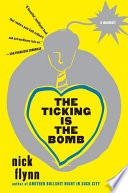I loved Nick Flynn’s Another Bullshit Night in Suck City: A Memoir so when I found out that he subsequently wrote two additional memoirs, I knew that I was in. The Ticking Is the Bomb: A Memoir is Nick Flynn’s second memoir, and it focuses on the time after he obtained some level of fame and success, but is just as unmoored by the pain and displacement unintentionally inflicted by his mother’s suicide and his encounters with his narcissistic alcohol-fueled father before he became grounded as a father.
In Another Bullshit Night in Suck City: A Memoir, Flynn interweaves events of his life with his father’s story. In The Ticking Is the Bomb: A Memoir, he interweaves his efforts to emerge from loss with the nation’s embrace of torture in both the Vietnam and latest Iraq war as a way to control a personal narrative of loss. While Flynn does something objectively compelling by paralleling personal and (inter)national loss and the embodiment of narrative in our actions, the (inter)national overshadows the personal aspects of The Ticking Is the Bomb: A Memoir and makes the overall story less memorable and timeless as opposed to his earlier memoir which deals with universal themes of family dysfunction.
The Ticking Is the Bomb: A Memoir does a great job of highlighting how tales of abuse still privilege the perpetrators’ voice and reasons, which should be less credible, over the victims’ voices. “What we are offered is an endorsement of the version of events of that night as told by the torturers…Whether you chose to believe Amir is another issue, but it seems one should at least give as much ink to him as is given to his tormentors. pg. 234.” Flynn explicitly criticizes Errol Morris’ New York Times’ essay, which I have not read, but is excerpted in The Ticking Is the Bomb: A Memoir. Flynn critiques Morris’ focus on the tale told by the torturers and his dismissal of Iraqi victims’ pain and characterizes, “Morris, for his part, risks being known as the man who views Abu Ghraib as primarily a problem with getting the captions right, rather than a moral catastrophe. pg. 209” I’m not sure how this issue directly correlates with Flynn’s personal pain except that he sees a risk of becoming a part of the story, relating to and resembling the torturers instead of being who he really is, seeing them and relating to the victims as fully human with stories of their own. Also there is a connection between his father’s tall tales that happen to be true and the possibility that Flynn’s father was also a victim of torture. I lost poetry sometime during law school so I’m sure that the connections are more obvious than I can discern.

The Ticking Is the Bomb: A Memoir
Stay In The Know
Join my mailing list to get updates about recent reviews, upcoming speaking engagements, and film news.




